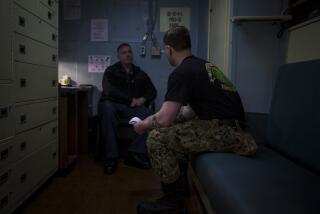Firms Find Chaplains Are an Added Bonus : Workplace: Companies are finding that such clergy can provide short-term help. More than 50 corporations have full-time ministers.
- Share via
In the annals of collective bargaining, chaplains have never ranked up there with salary increases and more vacation time. But now employees and their managers are increasingly seeing chaplains as a bottom-line benefit.
By increasing its force of industrial chaplains, corporate America is taking an unusual step to improve productivity among employees, according to several experts involved in training and supplying chaplains.
Chaplains are proving to be extremely valuable in factories and office buildings--offering immediate counseling in the face of bad news, seeing employees through marital or family disputes and, in at least one case, disarming a worker who planned to shoot his manager.
General Motors, Carolina Telephone & Telegraph and the shipping company Allied Systems are three of more than 50 U.S. corporations that employ full-time chaplains. In addition, the United Auto Workers union sponsors at least part-time chaplains in every plant where its members are employed, even when the corporation is not paying for one. And hundreds of other companies use part-time or volunteer chaplains.
“It’s been a gradual realization that the workplace absorbs an enormous amount of time for individual workers,” said Jim Townsend, associate general secretary of the Division of Chaplains and Related Ministries of the United Methodist Church. “Going to see a chaplain during the day isn’t possible, and companies are seeing the value of having one on site.”
“In the workplace, our greatest service to employees is to be available--right now,” said the Rev. Rodney Brown, a United Methodist minister who is director of employment counseling at R.J. Reynolds Tobacco Co. in Winston-Salem, N.C., which in 1949 created what has become the nation’s oldest full-time workplace ministry.
Brown said the greatest stresses affecting employees are marriage and family issues, followed by alcohol and drug addiction. No. 3 is job security related to layoffs and corporate takeovers. “It was ranked seventh in 1967 when I first joined the company,” he said.
Chaplains representing all major denominations have traditionally served in the U.S. military, with police and fire departments and in hospitals.
America has 15,000 to 20,000 chaplains, ranging from lay volunteers to ministers working full time in the field. In 1988, the American Assn. of Ministry in the Workplace identified at least 2,000 industrial chaplains in the United States. The number is growing steadily, according to the group, which was founded five years ago to increase awareness of the need for chaplains in industrial America.
Although none of those involved in supplying chaplains could provide precise numbers, all said there has been a noticeable increase in interest and hiring at the corporate level during the last five years.
“From the corporate perspective, it’s a matter of how many man-hours can a chaplain save a company by meeting with the employee on the job site,” said George Schurman, an independent oil producer, a Methodist layman and president of the American Assn. of Ministry in the Workplace.
Schurman said the most powerful story he heard from a factory chaplain involved a distraught employee who brought a handgun to work one morning, planning to kill his manager. But unlike recent incidents in which disgruntled workers have carried out workplace violence, the matter ended peacefully. The employee, after talking with the chaplain, gently took the pistol out of his pocket and put it on the chaplain’s desk.
Townsend said: “We see the chaplain moving around the setting, touching people and demonstrating love and concern to the workers. Presence is essential. Being is more important than doing. We don’t see chaplains as doing long-term therapy. We see them helping people with shorter-range issues” or helping workers locate help for bigger problems.
Father Ken Czillinger, director of priest personnel for the Roman Catholic Archdiocese of Cincinnati, said: “That type of position offers tremendous potential in the workplace. It’s very creative in the area of wellness to have someone on the scene who can deal with the emotional needs--and maybe the spiritual needs of employees. So many people are hungering to be listened to and also hungering for the spiritual elements of life.”
Although the modern corporation’s interest in chaplains is relatively new, ministry for industrial workers is not. “You can go back to the Middle Ages and find clergy meeting the people in their workplace,” Schurman said. “And John Wesley (founder of Methodism) met miners as they were headed into the mines.”
More to Read
Inside the business of entertainment
The Wide Shot brings you news, analysis and insights on everything from streaming wars to production — and what it all means for the future.
You may occasionally receive promotional content from the Los Angeles Times.










